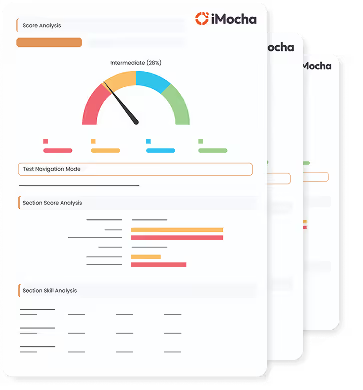


Choose easy, medium, or tricky questions from our skill libraries to assess candidates of different experience levels.
Choose easy, medium, or tricky questions from our skill libraries to assess candidates of different experience levels.

Choose easy, medium, or tricky questions from our skill libraries to assess candidates of different experience levels.

Choose easy, medium, or tricky questions from our skill libraries to assess candidates of different experience levels.
This a comprehensive PDF report, which you can instantly download and share with your hiring team or candidates for seamless collaboration.
Download Sample Report



Our Business English language test is the most preferred online skills assessment used by recruiters and hiring managers to quantify the English language proficiency of candidates. This test evaluates the candidate's speaking, writing, reading, and listening skills. This online Business English test can reduce hiring costs and time-to-hire by 40%.





%20(1).webp)
Business English is used in professional contexts, such as international trade, finance, law, etc. Business English is much more formal than general English focusing on concise, clear communication, and specialized vocabulary. It's useful for presentations, meetings, selling, emails, networking, and socializing.
Why use AI-EnglishPro - Business English Proficiency Test?
As per Cambridge English, IT employees need to possess varying degrees of Business English skills to carry out their jobs. Therefore, it becomes imperative that, along with the core skills, employees are also assessed on their business English skills. However, most of the assessments are home-grown, lack reliability, and are prone to biases.
Business English online test must be reliable, conform to accepted standards, and be free of biases. In addition, it must be scalable to conduct mass recruiting in a swift, accurate, and timely manner.
iMocha's AI-EnglishPro™ is an advanced AI-powered assessment platform that evaluates business English proficiency across clarity, precision, understanding, and context. This sophisticated tool combines sentiment analysis and contextual comprehension to deliver precise evaluation of business language skills through a streamlined interface.

Business English test is designed keeping in mind the Council of Europe's Framework of Reference for Language (CEFR). AI-EnglishPro uses Natural Language Processing tools, Computational Linguistics, and Text Analysis to provide input about the proficiency levels of the candidates and/or your existing employees.
It is a 30-minute test divided into four parts:
Speaking,
Writing,
Reading and
Listening.
Speaking & Writing adhere to the CEFR standards (Common European Framework of Reference for Languages) in its marking pattern, level of difficulty/proficiency, and content curation. Business English online test evaluates proficiency on the core parameters like Reading, Writing, Speaking, and Listening with accurate and intelligent sentiment analysis.







.webp)
.webp)
.webp)
.webp)



